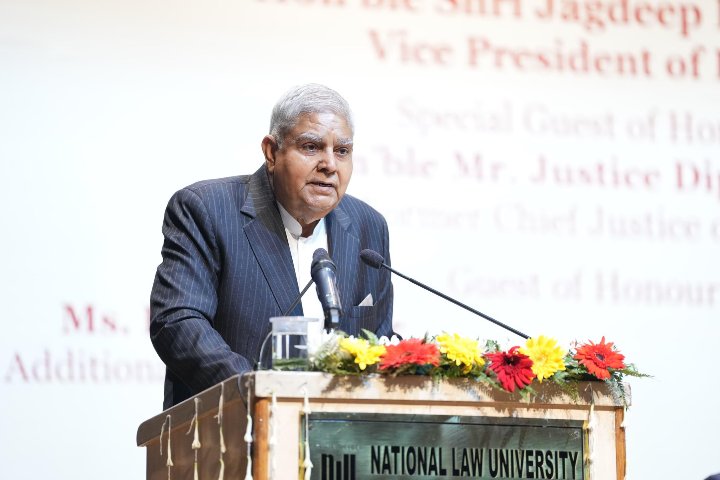VP Dhankhar Advocates Direct Aid and Agri-Entrepreneurship for Farmer Prosperity
Speaking passionately on the economic upliftment of India’s farming community, Vice President Dhankhar stated that meaningful progress would only occur when all government aid reaches farmers directly.

- Country:
- India
In a powerful and wide-ranging address at the inaugural session of the Agri-Industry Conclave held in Narsinghpur, Madhya Pradesh, on May 26, 2025, Vice President Shri Jagdeep Dhankhar strongly advocated for a transformative shift in the country’s approach to agricultural support. Emphasizing the need to directly empower farmers, he called for replacing indirect subsidies with direct financial aid and nurturing a new class of “agripreneurs” to integrate agriculture with industry and commerce.
Direct Support: A Game-Changer for Farmers
Speaking passionately on the economic upliftment of India’s farming community, Vice President Dhankhar stated that meaningful progress would only occur when all government aid reaches farmers directly. Drawing a comparison with the United States, he highlighted that American farmers earn more than average households, largely due to effective, direct governmental support mechanisms.
“In our country, fertilizers and many other inputs are subsidized, but these are indirect. If all such subsidies were provided directly, each farmer could receive at least ₹35,000 per year,” he said. He urged the Indian Council of Agricultural Research (ICAR) to take cognizance of this perspective and develop a comprehensive paper outlining the benefits and feasibility of direct aid mechanisms.
While acknowledging the success of initiatives like the PM-KISAN Samman Nidhi, which transfers funds directly to farmers’ bank accounts, Shri Dhankhar stressed that it is time to expand this model to cover all forms of support. “This would be immensely beneficial,” he emphasized, adding that it would result in a more accountable and transparent welfare system.
Agriculture: Beyond Economy, A Pillar of National Identity
The Vice President underscored that agriculture is not merely an economic activity but is deeply entwined with India’s cultural and industrial fabric. “Half of our population is dependent on agriculture,” he noted, applauding the efforts of Madhya Pradesh Chief Minister Shri Mohan Yadav in linking agriculture with industrial growth and development. He added that agriculture must now be seen as a national priority, transcending traditional boundaries.
Saluting Armed Forces and National Security Initiatives
Shifting his focus momentarily to national defense, Shri Dhankhar invoked the valor of the Indian Armed Forces. Referring to the bold water policy move by Prime Minister Narendra Modi, which halted water flow to Pakistan following acts of terror, the Vice President lauded this decisive act as a strong geopolitical message.
He made special mention of Operation Sindoor, an anti-terrorism strike led by India in response to events in Pahalgam. “India struck deep into enemy territory — Bahawalpur and Muridke — targeting terrorist infrastructure. The world has acknowledged our response. No one is asking for proof because the consequences spoke for themselves,” he declared.
Economic Rise: India’s Global Climb
Reflecting on India’s economic strides over the past decade, Shri Dhankhar celebrated the nation's ascent to become the fourth-largest economy globally, surpassing long-standing industrial powers like France, England, and Japan. He predicted that India would soon overtake Germany, moving into third place.
This rise, he said, is fueled by massive infrastructure projects and policy reforms that have enabled both urban and rural progress. He positioned agriculture as the cornerstone of this economic growth, stating that “agriculture can no longer be viewed in isolation.”
Rise of the ‘Agripreneur’: Vision for the Future
A key focus of Shri Dhankhar’s speech was the need to transition Indian farmers into entrepreneurs — or “agripreneurs.” He encouraged farmers to take the lead in value addition, marketing, and processing of their produce and called on agricultural institutions, elected representatives, and NGOs to support this transformation.
“There are 730 Krishi Vigyan Kendras across the country and several institutions under ICAR. All are active now. The direction I outlined earlier in Mumbai is becoming a reality,” he said. He also proposed that agro-industries, along with MPs and MLAs, adopt villages and support them in becoming hubs of agri-business innovation.
The Vice President urged the youth to explore ventures in dairy, processed foods, horticulture, and cold-chain logistics, noting that India must not limit itself to basic dairy products but aim for global leadership in high-value offerings like ice cream and ethnic sweets such as rasgullas.
Praising Madhya Pradesh's Livestock Leadership
Shri Dhankhar specifically lauded Chief Minister Mohan Yadav’s initiatives in livestock development, particularly in dairy, fruit, and vegetable production. He expressed optimism that India would soon lead the world in these sectors, propelled by innovative technologies and proactive governance.
A Patriotic Spirit in Agriculture
He concluded with a heartfelt tribute to the resilience and patriotism of Indian farmers. “Even when rains fail or hardships arise, our farmers never give up. Their dedication is unmatched,” he said. He reaffirmed his belief that empowering farmers through direct aid and entrepreneurship will help India achieve its goal of becoming a developed nation before the centenary of its independence in 2047.










